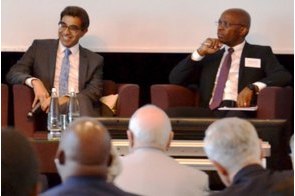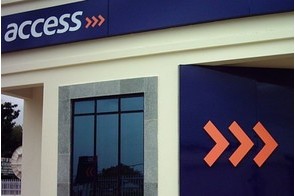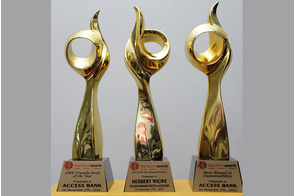Access Bank as practitioner and advocate of sustainability

Summary
Sustainability is fast becoming the way to do business and compete successfully, globally and over the long term.
On December 06, 2017, Omobolanle Victor-Laniyan, Head of Sustainability at Access Bank Plc, and Isaiah Owolabi, Project Director at Hacey Health Initiative, were on CNBC Africa's Closing Bell to discuss the benefits of sustainable business practices. Afterwards, Ms Victor-Laniyan was interviewed by Jide Akintunde, Managing Editor, Financial Nigeria publications.
Jide Akintunde (JA): 2017 was a very rewarding year for Access Bank Plc with regard to its commitment to sustainability. After scooping five awards at the SERAS-CSR Awards 2017, the Bank literally took all the awards at the maiden Sustainability Awards of the Central Bank of Nigeria (CBN). What underlines Access Bank's commitment to sustainability?
Omobolanle Victor-Laniyan (OVL): Sustainability encapsulates responsible business practices. It is the whole gamut of the duty of care a bank, or any organization, needs to observe. This entails the care for society, the environment as well as financial performance.
We are aware of the view that says adding social and environmental considerations to the concern for financial bottomline by a business would impair its profitability. Access Bank believes the opposite. Indeed, our belief has strengthened over the years, that lack of commitment to the society and the environment would weaken the competitiveness and leadership potentials of any corporate organisation.
Some 10 years ago, Access Bank decided to embed sustainability into its entire operations. We had the understanding that not doing so would be tantamount to swimming against the tide. But given that sustainability was a relatively new concept then, although a very important commitment, Access Bank decided to take on the two roles of a practitioner and an advocate. This explains our leadership in this space and the recognitions that you alluded to.
JA: My observation is that, whereas Access Bank positions as a leader in sustainability – both in Nigeria and Africa – a lot of your work is collaborative. What underpins this approach?
OVL: Sustainability is about making real impacts. The scope for this, and the needs to address, are so wide. Attempting to act alone in addressing the needs for social and environmental interventions is in itself unsustainable. As such, at Access Bank, we define sustainability as “supporting global and local efforts and providing innovative solutions to social and environmental challenges in the society.”
We do our best to promote social and environmental responsibility in the financial services sector. Whereas our strategy in this space is cooperation, we believe the competition to do social good and promote environmental preservation is positive, to the extent that we are talking about real solutions. Therefore, Access Bank innovates and promotes several sustainability initiatives. Some of our advocacies have evolved into regulatory frameworks by the CBN. We regularly hold learning and networking events to raise awareness and support professionals in sustainability in the African financial services industry. We also work with our clients to ensure their projects – for which they seek the bank's funding – remove or mitigate environmental and social risks.
Access Bank has also been building wider networks in the private sector and in the international community to address wider societal and environmental issues. We have been very active in the health sector, as a key promoter of the “Malaria to Zero” initiative. Malaria wrecks a lot of havoc on people and productivity. Estimated 216 million cases of malaria occurred in 91 countries in 2016, according to the World Health Organisation. The same year, malaria deaths reached 445,000. Africa shares a disproportionately high percentage of the global malaria burden. The disease costs Africa an estimated $12 billion per year in direct costs, while it reduces GDP growth by 1.3 percent annually. This shows the scale of the malaria scourge, which we cannot continue to accept by not fighting it more determiningly.
Access Bank and the Private Sector Health Alliance, with Hacey Health as a lead implementation partner, have been promoting the implementation of the Malaria to Zero campaign. The goal is to save one million lives over the next five years in Nigeria alone. In the past 18 months of the implementation of the initiative, we have helped in saving over 300,000 lives. The Bill Gates Foundation has backed this initiative, which supports the national agenda to eliminate malaria by 2020.
The Malaria to Zero initiative is a multi-pronged, holistic approach that includes health promotion, seasonal malaria prevention through the distribution of long-lasting insecticide treated bed-nets, supporting research with funding, and volunteering by Access Bank's employees. In the past one year, the bank's staff have expended over 1.9 million hours, volunteering in the communities where we operate.
JA: These commitments cost money. There has been the view that sustainability not only increases the cost of business, it could make a business uncompetitive. What has been the experience of Access Bank?
OVL: You are right, but that view has been in a recession. Far less people still believe that adhering to sustainability principles erodes the ability to compete, and profitability. On the contrary, sustainability is fast becoming the way to do business and compete successfully, globally and over the long term. There is now the Sustainable Development Goals. The SDGs tie global and local progress to some 17 development goals and 169 targets, all promoting social and environmental sustainability. Together with the Paris Climate accord, the SDGs are the standards for operation and competition for any corporate organisation. And I dare say that the potential cost of inaction in these areas of global commitment is quite high.
Access Bank devotes 1 percent of its profit after tax to promoting its sustainability initiatives. There is Board support for this, and for embedding sustainability in our entire operations. The resources we put into promoting sustainability are viewed by the leadership of the bank as valuable investments. They enhance our brand and they are a key frontier of the respectability of Access Bank.
JA: How motivating are the recognitions that Access Bank has been getting for its commitment to sustainability?
OVL: The awards tell us that we are doing the right things. And I believe they also fit into our vision of advocacy. We want to inspire other corporates and banks to be committed as well. However, these awards confirm the leadership of Access Bank as an African FI. In 2016, the Bank became the first African financial institution to win the Karlsruhe Global Sustainable Finance Award, which holds yearly in the City of Karlsruhe, Germany. We retained what is acknowledged as the most coveted of the awards – the Award for Outstanding Business Sustainability – in 2017.
Regionally, Access Bank won five awards at the 2017 SERAs-CSR Awards. Our Group CEO, Herbert Wigwe, was given an award as Sustainability Champion and I also got an award as the Most Outstanding CSR Practitioner for the Year 2017. To crown these, Access Bank won all the awards at the maiden CBN Sustainability Awards 2017. Access Bank won the CBN awards for Most Sustainable Bank of the Year; Excellence in Women Economic Empowerment; Sustainable Transaction of the Year (Oil and Gas); and Sustainable Transaction of the Year (Agriculture).
Related
-
Innovative financing as key to closing SDG funding gap
One of the ways Access Bank has demonstrated its leadership in sustainable finance is through its green bond issuance.
-
Access Bank, FMDQ, others launch Nigerian green bond market development programme
The global green bond market has seen strong growth, with bond issuance rising from $11 billion in 2013 to almost $157 ...
-
Access Bank emerges as Best Brand in Sustainability in Nigeria
Access Bank Group Managing Director and CEO, Herbert Wigwe, was bestowed the award of CEO of the Year (Financial Services).







